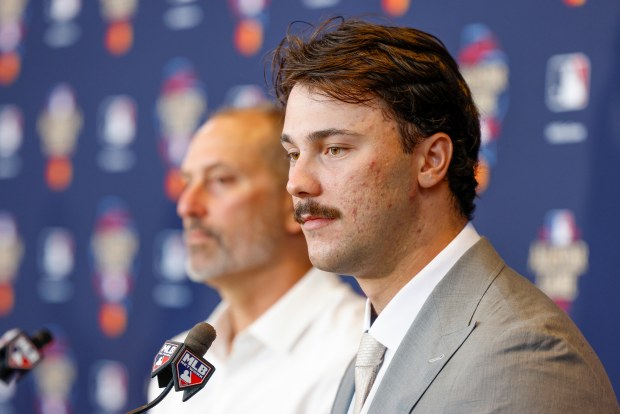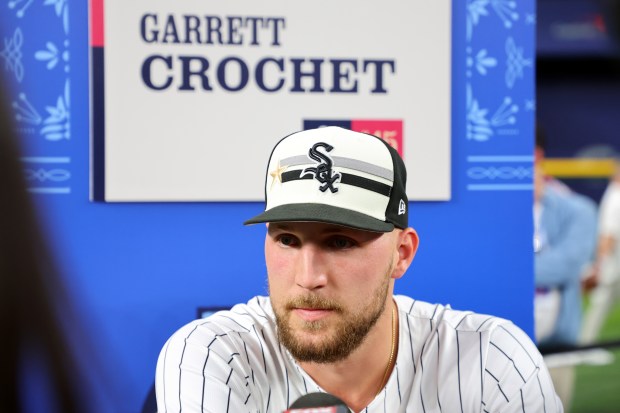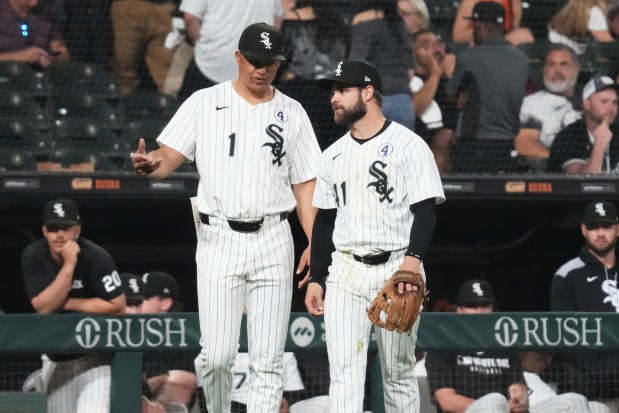ARLINGTON, Texas — The paths Shota Imanaga and Garrett Crochet took to become All-Stars couldn’t have been more diverse.
The fact both are here for Tuesday’s MLB All-Star Game at Globe Life Field says a lot about their perseverance, and what can happen when you put your mind to it.
“I was talking to my wife about it,” Crochet said Monday during workout day. “We thought we were going to be in Triple A to start the year, and here we are. It came full circle really fast.”
Crochet was the top draft pick of the Chicago White Sox in 2020 and was brought to the majors only months after being drafted in the pandemic-shortened season. But then he fell off the map following Tommy John surgery and entered spring training in February with a chance to prove himself all over again.
Imanaga came over to the Chicago Cubs last winter from Japan, where he was a talented pitcher who toiled in relative obscurity behind stars like Yoshinobu Yamamoto. It looked to many as though the Cubs had settled for a cheaper option, signing Imanaga for $53 million over four years after Yamamoto broke the bank with a 12-year, $325 million deal with the Los Angeles Dodgers.
Even on Monday, Imanaga took a back seat to a fellow Japanese star. When the media was allowed on to the field to interview players at Globe Life Field, a mad dash to Shohei’s Ohtani’s booth dwarfed the number of TV cameras at Imanaga’s.
“Right now I’m losing to Ohtani by a little bit,” Imanaga joked through an interpreter. “Hopefully by the end of the All-Star Game, I can beat him in the amount of cameras here.”
Crochet and Imanaga are among the 38 first-time All-Stars in a game that’s eagerly shedding the old guard to welcome in the new.
That’s probably why National League manager Torey Lovullo of the Arizona Diamondbacks selected Pittsburgh Pirates rookie Paul Skenes to start, despite Skenes having only 11 major-league starts under his belt.
It’s show biz, and baseball needs some new stars to show off.
Back before the Chicago Tribune invented the All-Star Game in 1933, the concept was not considered a sure thing at all. Sportswriter Westbrook Pegler wrote that the exhibition was “regarded strictly as an experiment, and both leagues have left themselves in a position to disown the notion. The idea originated with Arch Ward, the sports editor of the Chicago Tribune, who doubtless had it in mind to sell a few newspapers, which is a laudable desire in a sports editor.”
Even back then it was all about making money and selling a product. From Babe Ruth in the 1933 game at old Comiskey Park to Skenes in Tuesday’s game, hyping the stars is what matters.
Skenes may not be a household name to those who don’t live in Pittsburgh or have MLB.tv, since the Pirates rarely are shown on ESPN or Fox. But if he hits 102 mph on a few pitches Tuesday and gets through unscathed, he could be as big as NBA rookie Victor Wembanyama, figuratively speaking.
Skenes said Monday he couldn’t speak to the comparison of himself and “Wemby.”
“I don’t watch the NBA at all,” he stated matter-of-factly.
Baseball needs players like Skenes to emerge to help market the game. He may not realize it, but there are plenty of NBA fans who don’t watch baseball at all: All-Star Game viewership had plunged from nearly 19 million viewers in 1998 to around 7 million last year.

The Home Run Derby, which will take place Monday night without its two biggest sluggers, Aaron Judge and Ohtani, typically is the more popular event.
Usually the managers wait until the workout day to announce their starters, but Lovullo leaked it last week after watching Skenes throw seven no-hit innings against the Milwaukee Brewers.
“I couldn’t wait to tell the world,” he said of what he called a “no-brainer” pick.
American League manager Bruce Bochy, who came out of retirement to manage the Texas Rangers to their first World Series title in 2023, went the more traditional route, choosing Baltimore Orioles ace Corbin Burnes based on his stellar career to date.
Crochet, Detroit’s Tarik Skubal and other deserving first-year candidates would have to wait.
“It’s just his time,” Bochy said of Burnes.
Burnes is more than qualified, but he’s not a “name” player. That’s why a Skenes-Judge matchup in the first inning Tuesday is what the MLB honchos are praying for.
“Just an incredible pitcher, and what he’s doing for the game, it’s huge in such a short amount of time,” Judge said of Skenes. “It’s been pretty cool.”
Since Bochy opted to bat Judge fourthin the lineup, it would only happen if someone reaches base off Skenes, whose fastball has been clocked at 102 mph. Lovullo said Monday it’s doubtful Skenes would pitch past the first inning. Maybe Lovullo can order an intentional walk to Gunnar Henderson, the No. 2 hitter, to ensure Skenes faces both Juan Soto and Judge.
If Bochy is thinking in terms of promoting the game, Crochet, who leads the majors in strikeouts, should be in early to face Ohtani, a player he’s owned so far in their brief encounters. It’s a win-win for baseball.
Trade talk was a hot topic with Crochet, who was asked about reports he’s on the market no less than a half-dozen times in the first 15 minutes of his media session. He responded the same way he has all season, saying it’s a good thing to be mentioned because it means you’re performing.
Of course, why the Sox would trade their only All-Star is another question altogether. If he was truly unsignable, perhaps it would make sense. But chances are the Sox don’t even want to think about paying Crochet what he’d be worth by the time he hits free agency in two years.
I asked Crochet on Monday about a report the Sox were likely to deal him after fruitlessly engaging him in contract talks.
“No offers,” Crochet said.
None?
“False (report),” he said.
Would he be interested in an extension from the Sox?
“The door has been open for that all along,” he said.
Imanaga, meanwhile, wasn’t asked about being traded. He just got here, after all. But one press box wag asked Imanaga why the Cubs wouldn’t be sellers based on their record and hefty payroll.
“I don’t know,” Imanaga said. “If I have an opportunity to meet the owner, I’ll ask him.”
When the reporter said he was surprised that Imanaga had never spoken with Chairman Tom Ricketts, Imanaga clarified that he had indeed met him, but they didn’t talk about stuff.
Instead of talking about the owner, Imanaga was ready to talk about the peculiar American tradition of turning right on red, and how Japanese showers can be controlled to have the right temperature before you get in, instead of having to fiddle with the knob until it feels OK.
The time for talking ended Monday. On Tuesday, Imanaga and Crochet will get their chance on the national stage. Skenes, too.
Might be worth checking out.




